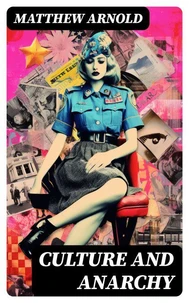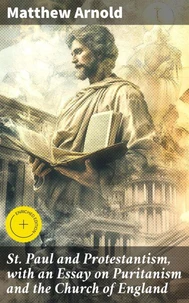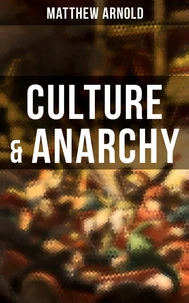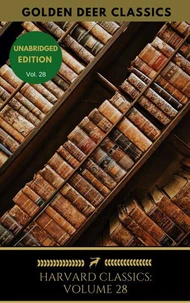Culture vs. Anarchy
Par :Formats :
Disponible dans votre compte client Decitre ou Furet du Nord dès validation de votre commande. Le format ePub est :
- Compatible avec une lecture sur My Vivlio (smartphone, tablette, ordinateur)
- Compatible avec une lecture sur liseuses Vivlio
- Pour les liseuses autres que Vivlio, vous devez utiliser le logiciel Adobe Digital Edition. Non compatible avec la lecture sur les liseuses Kindle, Remarkable et Sony
 , qui est-ce ?
, qui est-ce ?Notre partenaire de plateforme de lecture numérique où vous retrouverez l'ensemble de vos ebooks gratuitement
Pour en savoir plus sur nos ebooks, consultez notre aide en ligne ici
- Nombre de pages302
- FormatePub
- ISBN859-65--4740188-9
- EAN8596547401889
- Date de parution13/11/2022
- Protection num.Digital Watermarking
- Taille986 Ko
- Infos supplémentairesepub
- ÉditeurDIGICAT
Résumé
In "Culture vs. Anarchy, " Matthew Arnold presents a profound exploration of the role of culture in society. Written in the context of Victorian England, Arnold critiques the prevailing anarchical tendencies of his time, advocating for a cultural framework that transcends mere social progress. His literary style is marked by eloquent prose and a methodical approach, blending critical analysis with philosophical inquiry, ultimately proposing that culture serves as a means to achieve moral and social cohesion.
Arnold's work stands out as a reflection on the tension between individualism and collective responsibility, engaging with the sociopolitical issues of his era while offering timeless insights about the human condition. Matthew Arnold (1822-1888) was not only a prominent poet but also a fierce advocate for educational and social reform, shaped by his experiences as an inspector of schools and a cultural critic.
His background made him acutely aware of the limitations of industrial society, provoking him to inquire into the essential nature of culture. Arnold's commitment to elevating public discourse through art and learning directly informs his arguments in this seminal text, positing that a well-cultured society is key to preventing moral decay. "Culture vs. Anarchy" is an essential read for anyone interested in the interplay between culture and societal structures.
It challenges readers to reflect on the importance of cultural values in shaping ethical governance and individual integrity. For scholars, students, and general readers alike, Arnold's work remains a compelling invitation to consider how culture can be a formative force in an increasingly fractured world.
Arnold's work stands out as a reflection on the tension between individualism and collective responsibility, engaging with the sociopolitical issues of his era while offering timeless insights about the human condition. Matthew Arnold (1822-1888) was not only a prominent poet but also a fierce advocate for educational and social reform, shaped by his experiences as an inspector of schools and a cultural critic.
His background made him acutely aware of the limitations of industrial society, provoking him to inquire into the essential nature of culture. Arnold's commitment to elevating public discourse through art and learning directly informs his arguments in this seminal text, positing that a well-cultured society is key to preventing moral decay. "Culture vs. Anarchy" is an essential read for anyone interested in the interplay between culture and societal structures.
It challenges readers to reflect on the importance of cultural values in shaping ethical governance and individual integrity. For scholars, students, and general readers alike, Arnold's work remains a compelling invitation to consider how culture can be a formative force in an increasingly fractured world.
In "Culture vs. Anarchy, " Matthew Arnold presents a profound exploration of the role of culture in society. Written in the context of Victorian England, Arnold critiques the prevailing anarchical tendencies of his time, advocating for a cultural framework that transcends mere social progress. His literary style is marked by eloquent prose and a methodical approach, blending critical analysis with philosophical inquiry, ultimately proposing that culture serves as a means to achieve moral and social cohesion.
Arnold's work stands out as a reflection on the tension between individualism and collective responsibility, engaging with the sociopolitical issues of his era while offering timeless insights about the human condition. Matthew Arnold (1822-1888) was not only a prominent poet but also a fierce advocate for educational and social reform, shaped by his experiences as an inspector of schools and a cultural critic.
His background made him acutely aware of the limitations of industrial society, provoking him to inquire into the essential nature of culture. Arnold's commitment to elevating public discourse through art and learning directly informs his arguments in this seminal text, positing that a well-cultured society is key to preventing moral decay. "Culture vs. Anarchy" is an essential read for anyone interested in the interplay between culture and societal structures.
It challenges readers to reflect on the importance of cultural values in shaping ethical governance and individual integrity. For scholars, students, and general readers alike, Arnold's work remains a compelling invitation to consider how culture can be a formative force in an increasingly fractured world.
Arnold's work stands out as a reflection on the tension between individualism and collective responsibility, engaging with the sociopolitical issues of his era while offering timeless insights about the human condition. Matthew Arnold (1822-1888) was not only a prominent poet but also a fierce advocate for educational and social reform, shaped by his experiences as an inspector of schools and a cultural critic.
His background made him acutely aware of the limitations of industrial society, provoking him to inquire into the essential nature of culture. Arnold's commitment to elevating public discourse through art and learning directly informs his arguments in this seminal text, positing that a well-cultured society is key to preventing moral decay. "Culture vs. Anarchy" is an essential read for anyone interested in the interplay between culture and societal structures.
It challenges readers to reflect on the importance of cultural values in shaping ethical governance and individual integrity. For scholars, students, and general readers alike, Arnold's work remains a compelling invitation to consider how culture can be a formative force in an increasingly fractured world.






